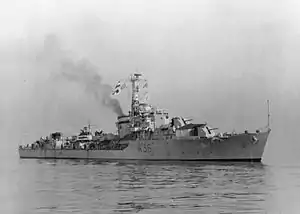 HMS Chieftain on the River Clyde, 1 March 1946. | |
| History | |
|---|---|
| Name | HMS Chieftain |
| Ordered | 24 July 1942 |
| Builder | Scotts Shipbuilding and Engineering Company, (Greenock, Scotland) |
| Laid down | 27 June 1943 |
| Launched | 26 February 1945 |
| Commissioned | 7 March 1946 |
| Identification | Pennant number: R36 later changed to D36 |
| Fate | Scrapped at Sunderland on 20 Mar 1961 |
| General characteristics | |
| Class and type | C-class destroyer |
| Displacement | 1710 tons[1] |
| Length | 362.75 ft (110.57 m)[1] |
| Beam | 35.66 ft (10.87 m)[1] |
| Draught | 10 ft (3.0 m) (mean), 16 ft (4.9 m) (max.)[1] |
| Installed power | 40,000 hp (30,000 kW) |
| Propulsion | Parsons geared turbines, 2 shafts; 2 Admiralty 3-drum type boilers[1] |
| Speed | 36 knots (67 km/h) |
| Complement | 186 |
| Armament |
|
HMS Chieftain was a C-class destroyer of the Royal Navy that was in service from March 1946, and which was scrapped in 1961.
Construction
The Royal Navy ordered Chieftain on 24 July 1942, one of eight Ch subclass of the C-class "Intermediate" destroyers of the 1942 Programme. She was laid down at Scotts Shipbuilding and Engineering Company, Greenock, Scotland, on 27 June 1943, and launched 26 February 1945.[1] She was commissioned on 7 March 1946, too late for World War II duty.[2]
Service
Chieftain was assigned to the 1st Destroyer Squadron based at Malta and served with the Royal Navy's 1945-8 Palestine Patrol, intercepting illegal immigration into Mandate Palestine.[3] In 1947 Chieftain intercepted three immigrant ships: a schooner, a former USCG cutter, and a former USN vessel. The ex-cutter Unalga renamed Chaim Arlosoroff got past the RN destroyer and managed to beach near Haifa: the other two were detained at sea.[4] She was given an interim modernization in 1954, which saw her 'X' turret at the rear of the ship replaced by two Squid anti-submarine mortars.[5] She saw duty during the Suez Crisis in 1956.
Decommissioning and disposal
Chieftain was decommissioned after the Suez Crisis and was scrapped in Sunderland on 20 March 1961.[6]
References
- 1 2 3 4 5 6 "Jane's Fighting Ships of World War II 1946/7", Jane's Publishing Company, London, UK, 1946, reprinted by Crescent Books, Avenel, New Jersey, USA, 1995, ISBN 0-517-67963-9, page 52.
- ↑ "HMS Chieftain (R 36)". uboat.net. Retrieved 23 May 2015.
- ↑ Stewart, Ninian (2002). The Royal Navy and the Palestine Patrol. Routledge.
- ↑ Palestine Patrol by the Royal Navy, article in Shipping - Today & Yesterday No. 203 January 2007 p.42, photograph p.38
- ↑ Marriott, Leo (1989). Royal Navy Destroyers Since 1945. Ian Allan Ltd. p. 64.
- ↑ Critchley, Mike (1982). British Warships Since 1945: Part 3: Destroyers. Liskeard, UK: Maritime Books. p. 98. ISBN 0-9506323-9-2.
Publications
- Colledge, J. J.; Warlow, Ben (2006) [1969]. Ships of the Royal Navy: The Complete Record of all Fighting Ships of the Royal Navy (Rev. ed.). London: Chatham Publishing. ISBN 978-1-86176-281-8.
- Marriott, Leo (1989). Royal Navy Destroyers Since 1945. Ian Allan Ltd. ISBN 0-7110-1817-0.